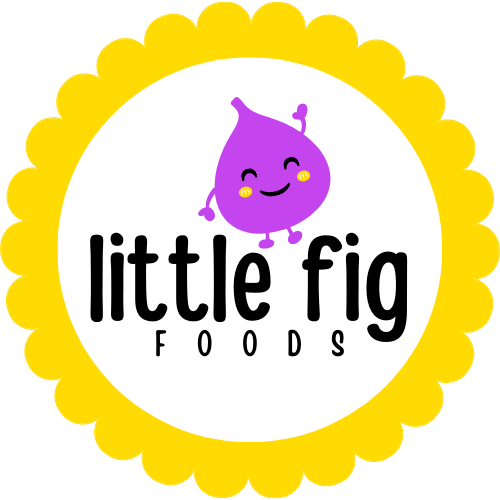Get ready for an exciting and exploratory journey as you introduce solid foods to your little fig! To help you navigate this important milestone with confidence, we have carefully curated a list of 110 wholesome first foods that are perfect for your little fig's culinary adventure before their first birthday. The below guide serves as a handy reference and a helpful tracking tool to monitor your baby's weaning progress.
Click here to download your FREE PDF copy of "110 Wholesome Foods for your Little Fig by ONE" food chart for easy tracking.

In our food chart, we grouped the foods into six main food groups, from a colourful array of vegetables and fruits to nourishing grains, proteins, dairy, nuts, seeds, and aromatic herbs and spices. Our list offers a diverse range of options to support your baby's growth, development, and a love for flavourful meals.
As you embark on this exciting journey, we also provide important information on highly allergenic foods and allergy awareness in a section below. Do pay special attention to this section and always consult with your healthcare provider before introducing new foods to your baby, especially if there is a family history of allergies or specific dietary considerations.
Remember, every baby is unique, so follow their cues, introduce foods gradually, and embrace the joy of exploring flavours together. Happy feeding and bon appétit!
Vegetables

Vegetables are packed with essential vitamins, minerals, and fibre, supporting your baby's overall growth and immune system. Butternut squash, zucchini, and spinach provide valuable nutrients like vitamin A and folate, while broccoli and cauliflower offer vitamin C and calcium for healthy bones and teeth.
Fruits
Fruits are nature's sweet treats, supplying your little one with vitamins, antioxidants, and dietary fibre. Avocado and banana are creamy delights rich in healthy fats and potassium, while apple, mango, and blueberries are bursting with antioxidants to boost their little bodies.
Grains, Breads, Pasta and Noodles

Grains provide energy and fibre for your baby's active lifestyle. Oatmeal and quinoa introduce essential iron, while rice and millet offer a gentle introduction to easily digestible carbohydrates. Whole wheat bread and pasta add variety and fibre to their diet. Noodles made from wheat, rice, or other grains are a popular option that can be enjoyed by babies. Choose noodles that are soft and easy to chew, and avoid those with added flavours or seasonings.
Protein
Protein is crucial for your baby's muscle and tissue development. Chicken and turkey provide lean protein, while fish like salmon, barramundi and cod offer omega-3 fatty acids for brain development. Tofu, lentils, and chickpeas are excellent plant-based protein options.
Dairy
Dairy products like yogurt and cheese contribute to your baby's calcium needs for strong bones and teeth. Cottage cheese and butter can be introduced in moderation.
You may note that we have not added cow's milk to this list. Cow’s milk should only be introduced after your baby turns one year old as it contains higher amounts of protein and minerals, such as sodium and potassium, which can put a strain on baby's immature kidneys. By waiting until your baby is one year old, you can ensure that their digestive system is more capable of handling the nutrients in cow's milk.
Additionally, when you decide to introduce cow’s milk, it is advisable to introduce full cream milk instead of skim or low-fat milk varieties. Full cream milk provides a higher fat content, which is essential for your baby's growth and development during their early years. The fat in full cream milk helps in the absorption of fat-soluble vitamins like vitamin A, D, E, and K, which are crucial for your baby's overall health.
Nut Butter and Seeds

Nut butter packed with healthy fats and protein, essential for your baby's growth and development. It is worth noting that the recommendations regarding the introduction of nuts have evolved in recent years. While it was previously advised to delay the introduction of nuts, current guidelines suggest that nut butters, such as almond butter or peanut butter, can be introduced to babies earlier, around 6-8 months of age. However, it is important to ensure that the nut butter is smooth and free from any large pieces that may pose a choking hazard. When introducing nuts and seeds, it is crucial to consider any family history of allergies, introduce these foods gradually and consult with your healthcare professional for personalised guidance.
Chia seeds, tiny powerhouses are loaded with fiber, healthy fats, and essential nutrients, can be introduced when baby is around 8 months old. However, it is essential to serve them only after they have been thoroughly soaked in a liquid and left to expand fully. Chia seeds have the unique property of absorbing large amounts of liquid and can expand in size. Soaking chia seeds helps make them easier to digest and reduces the risk of choking. For a smoother serving, grind chia seeds before adding any liquid or after they have been soaked through.
Herbs & Spices
Aromatic herbs and spices not only enhance the taste of your baby's meals but also offer potential health benefits. Cinnamon, ginger, and turmeric add a hint of flavour while providing anti-inflammatory properties.
Highly Allergenic Foods and Allergy Awareness
While we encourage you to explore a wide range of foods, it's important to be aware of highly allergenic foods and observe your baby for any signs of allergies. Some common allergens include eggs, nuts, dairy products, and seafood. Introduce these foods one at a time, waiting a few days before introducing a new food, to monitor any allergic reactions. Watch for symptoms such as rashes, hives, difficulty breathing, vomiting, or diarrhoea. If you suspect an allergy, consult your paediatrician for guidance. Keeping a record of foods your baby has tried will help in the easier identification of potential allergens.
Patience and Persistence is Key
Do not be discouraged if your baby does not seem interested in a new food. The number of times it takes for a baby to accept a new food can vary widely from one child to another. Some babies are more adventurous eaters and may accept a new food after just a few exposures, while others may need more time and repeated offerings. On average, it can take anywhere from 7 to 15 exposures to a new food before a baby becomes familiar with it and accepts it.
It's essential to remain patient and persistent when introducing new foods to your baby. The key is to keep offering a variety of foods, stay consistent, and create a positive mealtime environment. Gradually, most babies will expand their palate and become more accepting of different foods.
Have a memorable time feeding baby and enjoy the process!
The information provided in this article is for general informational purposes only and should not replace professional medical advice. Please consult with your healthcare professional for personalised guidance and recommendations based on your baby's specific needs and specific dietary considerations.
Click here to download your FREE PDF copy of "110 Wholesome Foods for your Little Fig by ONE" food chart.
Useful sources and references:
- Health Hub SG - Parent Hub: 0-2 Years
sg/programmes/183/parent-hub/baby-toddler/all-items-zero-two-years
- Centers for Disease Control and Prevention - Infant and Toddler Nutrition: Foods and Drinks for 6 to 24 Month Olds
https://www.cdc.gov/nutrition/InfantandToddlerNutrition/foods-and-drinks/index.html
- Mayo Clinic - Baby's first solid foods: How to get started
https://www.mayoclinic.org/healthy-lifestyle/infant-and-toddler-health/in-depth/healthy-baby/art-20046200
- Peanut Allergies: What You Should Know About the Latest Research & Guidelines
https://www.healthychildren.org/English/health-issues/conditions/allergies-asthma/Pages/Peanut-Allergies-What-You-Should-Know-About-the-Latest-Research.aspx

